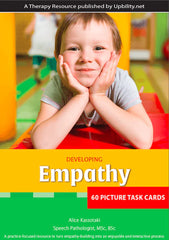In the vast and varied spectrum of human emotions, there is a subtle intersection of autism, emotional intelligence and empathy. With this post, we hope to unravel the tangle of the complexity of this intersection, shedding light on the myth that people with autism lack emotional intelligence and highlighting the power and importance of empathy in understanding autism.
Definition of key terms: emotional intelligence and empathy
To ensure the clarity of our discussion, it is important to define our key terms. Autism Spectrum Disorder (ASD) is a neurological and developmental disorder that affects the way a person interacts, communicates and learns. It is a spectrum condition, meaning that the impact and manifestation of symptoms can vary significantly between individuals.
Emotional Intelligence (EQ) is the ability to understand and manage the emotions of oneself and others. It includes skills such as emotional awareness, the ability to harness emotions and apply them to tasks, and the ability to manage emotions, including the ability to regulate one's own emotions and help others to do the same.
Empathy, a key component of emotional intelligence, is the ability to understand and share the feelings of others. It can be divided into two types: cognitive empathy (the ability to understand another's perspective) and emotional empathy (the ability to share another's emotional state).
Understanding autism and emotional intelligence
 Autism affects different aspects of a person's life, including the way they process and understand emotions. People with autism may experience and express emotions differently from neurotypical people, which does not mean that they lack emotional intelligence. Rather, it means that their emotional intelligence may take a unique form because of their different sensory experiences, ways of processing and ways of interacting with the world.
Autism affects different aspects of a person's life, including the way they process and understand emotions. People with autism may experience and express emotions differently from neurotypical people, which does not mean that they lack emotional intelligence. Rather, it means that their emotional intelligence may take a unique form because of their different sensory experiences, ways of processing and ways of interacting with the world.
Myth: Autism and lack of emotional intelligence
The stereotype that people with autism lack emotional intelligence is a misconception rooted in a limited understanding of autism. This view stems from the difficulties that some people with autism may have in social interaction and communication, which are key components of emotional intelligence. However, this stereotype is not only misleading, but also fails to acknowledge the rich emotional life and abilities of individuals with autism.
Autism and empathy: A complex relationship
Empathy in people with autism can often be misunderstood. While some individuals with autism may struggle with cognitive empathy, many are able to strongly experience emotional empathy. For example, a person with autism may not immediately understand why someone is upset, but may deeply share their distress once they do. This suggests that people with autism do not lack empathy, but rather may experience and express it differently.
The power of empathy in autism
 Empathy has a profound role in the lives of people with autism. Recognizing the power of empathy can help us appreciate the unique strengths and abilities of people with autism. Their heightened sensory experiences can lead to a deep empathic connection with their environment, enhancing their ability to connect with others on an emotional level.
Empathy has a profound role in the lives of people with autism. Recognizing the power of empathy can help us appreciate the unique strengths and abilities of people with autism. Their heightened sensory experiences can lead to a deep empathic connection with their environment, enhancing their ability to connect with others on an emotional level.
In addition, the intense focus and depth of interest that some individuals with autism can develop can also contribute to a rich emotional understanding in specific areas, demonstrating a unique manifestation of emotional intelligence.
Strategies for promoting emotional intelligence and empathy in autism
It is important to cultivate emotional intelligence and empathy in people with autism, as these skills can have a significant impact on their social relationships and overall quality of life. Parents, caregivers and teachers can use strategies such as explicit teaching of emotions, role-playing exercises, social stories and guided observation of social situations to help develop these skills.
Social role in supporting people with autism

Society plays a vital role in supporting people with autism. By fostering an environment of understanding and acceptance, society can help to dispel the myth of emotional disability in autism. Inclusive education and employment practices, positive media representation and public awareness campaigns can make a significant contribution to a more empathetic society. In addition, creating sensory-friendly environments and supporting policies that respect the unique needs of people with autism can also facilitate their participation and inclusion in society.
Conclusion
Understanding the intersection of autism, emotional intelligence and empathy is essential to debunking harmful myths and promoting a society that values and supports neurodiversity. While people with autism may experience and express emotions differently, this does not mean that they lack emotional intelligence or empathy. On the contrary, they often possess a unique form of emotional insight and a strong capacity for empathy.
It is vital that we, as a society, recognise and respect these different emotional experiences. As we work to cultivate empathy and emotional intelligence in people with autism, we must also strive to develop empathy towards them. Only then can we move from misunderstanding and stigma to understanding and acceptance.
Original content from the Upbility writing team. Reproduction of this article, in whole or in part, without credit to the publisher is prohibited.












